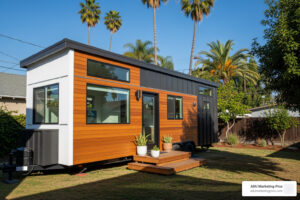If you’re wondering about adu guidelines los angeles, you’re not alone. Many property owners in Los Angeles are exploring Accessory Dwelling Units (ADUs) as a solution to meet diverse housing needs.
- ADU Definition: Commonly known as granny flats, in-law units, or casitas, ADUs are self-contained living spaces that share land with a primary residence.
- Housing Solution: ADUs offer flexible housing options for families and provide rental income while tackling the city’s growing housing challenges.
__
Los Angeles has seen a surge in ADU popularity thanks to recent regulatory changes aimed at alleviating housing shortages. These small homes present a versatile and cost-effective way to expand living space, create income-generating rental units, or provide a nearby place for family members to live. Whether you’re looking to increase your property’s value or generate extra income, understanding Los Angeles’ ADU guidelines is crucial for homeowners.
Understanding ADU Guidelines in Los Angeles
Navigating the ADU guidelines in Los Angeles can seem daunting, but understanding the key regulations is essential for homeowners considering this versatile housing option.
Key Regulations
-
Zoning Laws: ADUs are allowed in residential zones throughout Los Angeles, but it’s crucial to check specific zoning regulations for your neighborhood. These laws determine where you can build an ADU on your property.
-
Setback Requirements: Los Angeles mandates specific setback requirements, which dictate how far your ADU must be from property lines. Typically, these are 4 feet from the side and rear property lines, ensuring space and privacy for both ADU occupants and neighbors.
-
Maximum Size: In Los Angeles, the maximum size for an ADU is generally 1,200 square feet. However, the minimum max size all cities must allow is 800 square feet, regardless of the lot size.
-
Parking Regulations: One of the most significant changes in recent years is the relaxation of parking requirements. If your property is near public transit, you may not need to provide additional parking for the ADU.
-
Minimum Lot Size: While there is no minimum lot size requirement for ADUs in Los Angeles, the size of your lot may impact the size and type of ADU you can build.
-
Height Restrictions: ADUs in Los Angeles can be up to 16 feet tall. This allows for flexibility in design, including the possibility of a two-story unit.
-
Fire Safety: ADUs must comply with fire safety regulations, although recent laws have lifted the requirement for additional fire sprinklers if the main residence doesn’t have them.
Recent Changes in ADU Laws
Recent legislative updates have streamlined the process for building ADUs:
-
2024 Updates: New laws, like AB 1033, allow for the potential sale of ADUs separate from the main home, although this requires converting the property into a condominium—a complex and costly process.
-
California State Law: State laws have reinforced the requirement for cities to approve or deny ADU permits within 60 days, aiming to make the approval process faster and more transparent.
-
Streamlined Process: Recent changes have removed many bureaucratic problems, meaning you no longer need discretionary approval from neighbors or planning boards if your plans meet the established guidelines.
These updates and regulations make it easier than ever for Los Angeles homeowners to add an ADU to their property, providing a flexible solution to meet the city’s diverse housing needs. Understanding these guidelines is the first step in tapping into the benefits that ADUs offer.
Benefits of Building an ADU
Building an Accessory Dwelling Unit (ADU) in Los Angeles comes with a range of benefits, from financial gains to improved family living options. Let’s explore how ADUs can be a smart investment for homeowners.
Financial Incentives
Rental Income
Renting out your ADU can provide a steady stream of income. The amount you can charge depends on factors like location, size, and amenities. For instance, if you can rent your ADU for $1,500 a month, that’s $18,000 in annual income.
Property Value Increase
Adding an ADU can significantly boost your property value. A rough estimate is that your property value increases by 100 times the ADU’s monthly rental value. So, with a $1,500/month rental, your property could increase in value by approximately $150,000.
Family Housing
ADUs offer flexible housing solutions for families. They can be used to house aging parents, adult children, or even caregivers. This keeps loved ones close while maintaining their independence.
Financial Incentives
CalHFA ADU Grant Program
California offers various financial incentives to support ADU construction. The CalHFA ADU Grant Program provides funding assistance to make building an ADU more affordable. This can help offset construction costs, making it more accessible for homeowners.

Affordable Housing
ADUs contribute to the creation of affordable housing options. By providing additional units in existing neighborhoods, ADUs can help meet the demand for housing in a cost-effective way. This is particularly important in a city like Los Angeles, where housing costs are high.
Cost-Effective Construction
Constructing an ADU can be more cost-effective than other housing options. With streamlined regulations and financial incentives, the process has become more straightforward. This means less red tape and potentially lower construction costs, making ADUs an attractive option for many homeowners.
These benefits make ADUs a compelling choice for Los Angeles homeowners looking to maximize their property’s potential. Whether for rental income, family accommodation, or increasing property value, ADUs offer a flexible and financially rewarding option.
Next, we’ll dig into the different types of ADUs and how to choose the right one for your needs.
Types of ADUs
When considering building an Accessory Dwelling Unit (ADU) in Los Angeles, it’s crucial to understand the different types available and how they align with your property needs, space availability, and budget.
Detached ADUs
Detached ADUs are standalone units separate from the primary residence. They offer maximum privacy for occupants, making them ideal for rental income or housing family members. These units are perfect if you have ample backyard space and want a distinct separation from your main house.
- Best For: Large properties with space for a separate structure.
- Considerations: Requires more land and typically higher construction costs.
Attached ADUs
Attached ADUs are extensions of the existing home. They share at least one wall with the main house, offering a seamless integration while maintaining a separate living space. These are great for properties with limited space but still wanting to expand.
- Best For: Properties with limited yard space.
- Considerations: May require modifications to the existing structure, which can affect costs.
Conversion ADUs
Conversion ADUs are created by changing existing spaces like garages, basements, or attics into living units. This is often the most cost-effective option since it uses existing structures.
- Best For: Homeowners looking to minimize construction costs.
- Considerations: Limited by the size and condition of the existing space.
Junior ADUs (JADUs)
Junior ADUs are smaller units, typically up to 500 square feet, created within the existing footprint of a single-family home. They are a great option if you’re looking to add a small, independent living space without extensive construction.
- Best For: Homeowners with limited space and budget.
- Considerations: Must share some amenities with the main house, like a bathroom.
Choosing the Right ADU Type
Selecting the right ADU type involves evaluating your specific property needs, space availability, and budget considerations.
-
Property Needs: Determine if the ADU is for rental income, family housing, or personal use. This will influence the type and size you choose.
-
Space Availability: Assess your property’s layout. Do you have enough space for a detached unit, or would a conversion or attached ADU be more feasible?
-
Budget Considerations: Calculate your budget, including potential financial incentives like the CalHFA ADU Grant Program. Consider construction costs, permits, and any additional expenses.
By understanding these factors, you can make an informed decision on the best ADU type for your situation, maximizing both functionality and investment return.
Next, we’ll tackle some frequently asked questions about ADU guidelines in Los Angeles.
Frequently Asked Questions about ADU Guidelines in Los Angeles
When considering building an ADU in Los Angeles, many homeowners have questions about the restrictions and regulations involved. Here, we’ll address some of the most common inquiries.
What are the restrictions for an ADU in Los Angeles?
Vehicular Access and Setback Requirements
In Los Angeles, vehicular access is a key consideration. You must ensure that your ADU has adequate access for emergency vehicles, which often means complying with specific driveway or street access requirements.
Setback requirements are another critical factor. Typically, ADUs must have a minimum setback from property lines, often around 4 feet for side and rear yards. These setbacks help ensure privacy and safety for both the ADU and neighboring properties.
Can an HOA stop you from building an ADU in California?
HOA Restrictions and State Law
Under California state law, specifically AB 670, Homeowners Associations (HOAs) cannot outright prohibit the construction of ADUs. However, they can enforce design guidelines that align with the community’s aesthetic standards. It’s essential to review your HOA’s bylaws and CC&Rs (Covenants, Conditions, and Restrictions) early in the planning process to avoid potential conflicts.
It’s worth noting that while HOAs can impose certain design standards, they must comply with state laws that support ADU development. This means they can’t impose restrictions that would effectively prevent you from building an ADU.
What’s one drawback of an ADU?
Property Taxes and Assessed Value
One potential drawback of adding an ADU is the impact on property taxes. When you build an ADU, your property’s assessed value may increase, leading to higher property taxes. This is because the addition of a new dwelling unit typically raises the overall value of your property.
It’s important to factor in these potential tax implications when budgeting for your ADU project. Consulting with a local tax advisor can provide a clearer picture of how an ADU might affect your property taxes.
By understanding these key aspects of ADU guidelines in Los Angeles, you can steer the process more smoothly and make informed decisions that align with your goals and circumstances.
Conclusion
Building an ADU in Los Angeles can be a strategic move to boost property value and generate rental income. However, navigating the complex ADU guidelines in Los Angeles requires expertise and careful planning. This is where ADU Marketing Pros can be invaluable.
Our company specializes in digital marketing solutions custom for ADU construction and architecture firms. We understand the unique challenges faced by businesses in this sector, from zoning laws to evolving regulations. Our goal is to help you stand out in a competitive market by attracting high-quality leads and driving measurable growth.
The ADU sector is experiencing significant growth, driven by recent legislative changes and increasing demand for affordable housing solutions. With our targeted marketing strategies, including SEO, PPC, and social media campaigns, we ensure your firm reaches the right audience. Our approach is data-driven and adaptive, enabling us to respond swiftly to market changes and keep your business ahead of the curve.
Choosing the right marketing partner can make all the difference. By collaborating with ADU Marketing Pros, you gain access to a team dedicated to your success. We focus on showcasing your expertise and quality, helping you to attract clients who value craftsmanship over cost.
Ready to lift your ADU business? Explore our services and find how we can help you achieve your goals. Let’s build a strong, recognizable brand together in the growing ADU market.




